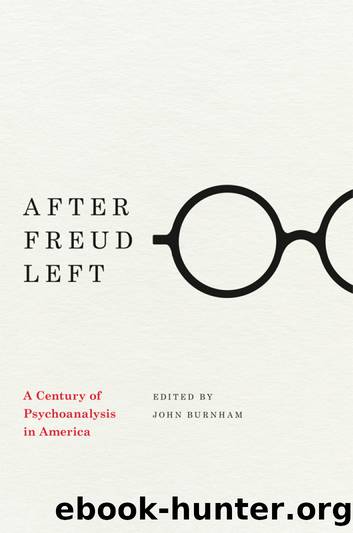After Freud Left by John Burnham;

Author:John Burnham;
Language: eng
Format: epub
Publisher: University of Chicago Press
Published: 2012-11-15T00:00:00+00:00
SEVEN
Freud, Anxiety, and the Cold War
LOUIS MENAND
Sigmund Freud and psychoanalysis enjoyed considerable professional and social success in the United States after 1945, success that persisted for twenty years. American psychiatry was dominated by psychoanalytic theory, and Freudian concepts flourished in both sophisticated and popular cultural realms. Historical analysis of this phenomenon is complicated, for a number of reasons. For one thing, it is not obvious why psychoanalytic theory appealed to a society generally antipathetic to abstract systems and philosophical pessimism. For another, âFreudianismâ in postwar America was not a unitary signifier. Like Marx, Freud enforced orthodoxy among his disciples; as did Marxâs, his followers turned his system to diverse ends after his death, some of which would probably have appalled him. Finally, and most strikingly, Freudianism managed to coexist in the cultural imagination with trends in psychiatry and intellectual life with which it was partly and sometimes wholly incompatible. Somehow, for a surprisingly long period, the incompatibility did little to subvert the cultural authority of Freudian theory. Freud was regarded as a pioneer of modern thought, a scientific discoverer, and psychoanalysis was considered the theoretical foundation for psychiatric practice. Psychoanalysis went through what one historian has described as a âgolden age of popularization.â1
The purpose of this essay is to suggest that one reason for the âfitâ between Freudianism and postwar American culture had to do with what might be called the Cold War discourse of anxiety. This discourse, too, was not unitary. It was an amalgam of strains in psychological, philosophical, political, and religious thought, not all of them consistent with one another. As in the case of psychoanalysis, the contradictions eventually produced some unintended consequences. For a prolonged period, thoughâstability being highly valued in the early Cold War yearsâthe concept of anxiety seemed, to many people, the key to the times. Insofar as that concept could be regarded as central to Freudâs thought (and the claim is debatable), Freudianism was incorporated into the eraâs self-understanding. As a discovery about the psyche, Freudianism validated the discourse of anxiety. As a general explanation of the contemporary condition, the discourse validated Freud.
The historiography of the Cold War is notoriously unsettled, and this has to do with an underlying controversy about whether the Cold War might have been avoided. The question seems a pointless counterfactual, except insofar as it was an issue internal to the Cold War itself: that is, arguments over whether the Cold War might have been avoided were part of the political culture of the Cold War period. One result has been an obsession with the postwar timeline. The practice is to stick a pin in the calendar at some point between Yalta, where the Allied leaders discussed the future of postwar Europe, in February 1945, and the declaration of the Truman Doctrine, when Harry Truman committed the United States to opposing internal and external threats to free societies, in March 1947, and to argue that the pin marks the moment when events tipped over into a Cold War geopoliticsâwith
Download
This site does not store any files on its server. We only index and link to content provided by other sites. Please contact the content providers to delete copyright contents if any and email us, we'll remove relevant links or contents immediately.
| Administration & Medicine Economics | Allied Health Professions |
| Basic Sciences | Dentistry |
| History | Medical Informatics |
| Medicine | Nursing |
| Pharmacology | Psychology |
| Research | Veterinary Medicine |
Bioenergetica by Alexander Lowen(1371)
The Child in You by Stefanie Stahl(1155)
Noise: A Flaw in Human Judgment by Sunstein Cass R. & Sibony Olivier & Kahneman Daniel(1118)
No Bad Parts by Richard C. Schwartz(1091)
The Data Detective by Tim Harford(1062)
Chatter by Ethan Kross(992)
The Science of Rapid Skill Acquisition by Peter Hollins(839)
Freedom by Sebastian Junger(774)
The Montessori Baby by Simone Davies(760)
The Quantum Psychiatrist: From Zero to Zen Using Evidence-Based Solutions Beyond Medication and Therapy by Biswas Dona(737)
Maps of Meaning: The Architecture of Belief by Jordan B. Peterson(676)
Evolution Gone Wrong: The Curious Reasons Why Our Bodies Work by Alex Bezzerides(641)
The Science of Self-Learning: How to Teach Yourself Anything, Learn More in Less Time, and Direct Your Own Education (Learning how to Learn Book 1) by Peter Hollins(631)
Sadomasochism and the BDSM Community in the United States by Stephen K. Stein(610)
Anxiety For Dummies by Charles H. Elliott & Laura L. Smith(606)
Why Sex Doesn't Matter by Olivia Fane(599)
Disconnected by thomas Kersting(591)
Jung - The Key Ideas: Teach Yourself (TY Philosophy) by Ruth Snowden(567)
The Mechanics of Passions: Brain, Behaviour, and Society by Alain Ehrenberg(565)
